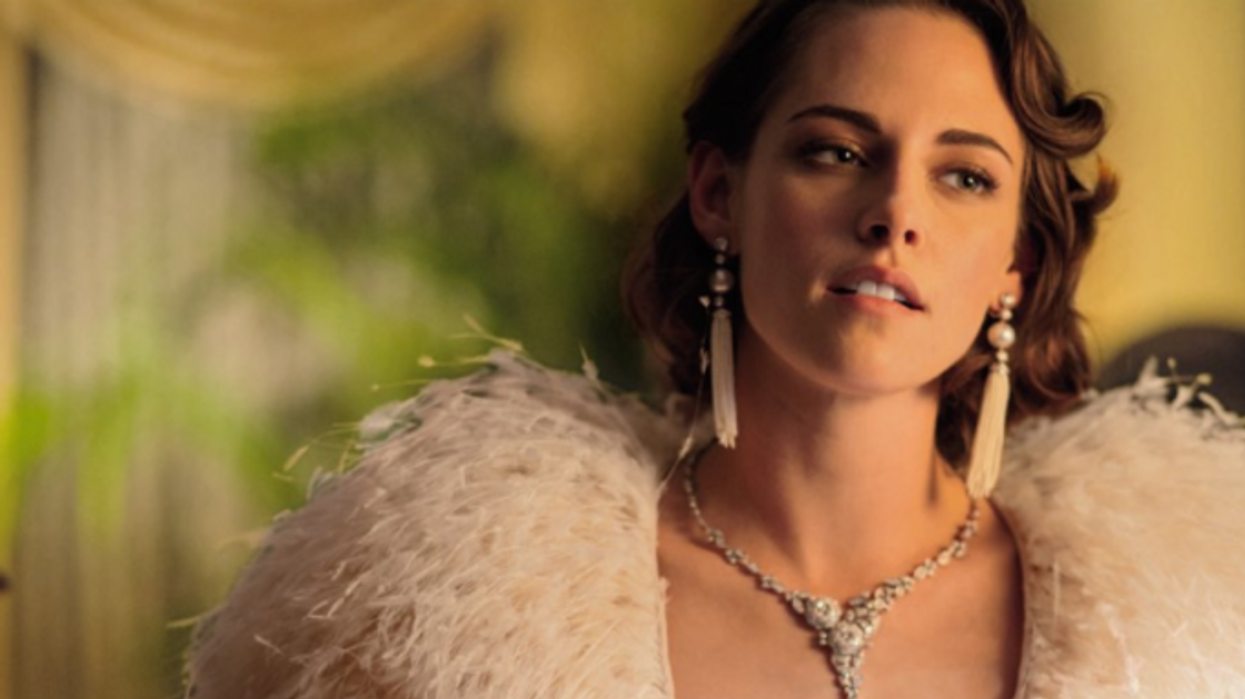Cinematography Reigns, Kristen Stewart Had to 'Prove Herself' in Woody Allen's 'Cafe Society'
In a press conference at Cannes 2016, Woody Allen, Vittorio Storaro, Kristen Stewart, and Jesse Eisenberg discussed cinematography, fame, and Hollywood.

Though all the Woody Allen building blocks are there—unrequited love, the allure of Tinseltown, that recognizable sardonic narrator—Cafe Society boasts a lot of firsts. The film is Allen's first collaboration with world-renowned cinematographer Vittorio Storaro, who lensed Apocalypse Now, The Last Emperor, and Last Tango in Paris. "I've worked with the best cinematographers in the movies," Allen said at the film's press conference, "but my path has not crossed with Vittorio's very often. He was available and I asked him to do it. He's one of the absolute great geniuses."
Cafe Society is also Allen's first digital film; Storaro shot on the Sony CineAlta F65 camera. But the director isn't phased. "To me, it was exactly the same," Allen said. "There's a camera, it tends to be lit, and the process is the same. " He admitted that digital affords more options in post-production, but when it came to the on-set experience, "nothing had to be different because it was digital."
For his part, Storario believes cinematography to be one of the highest arts— "it's the chance to underline the story visually, which is the most important thing"— but he isn't precious about the form it takes. "Part of the language of digital is the language of progress," he said of the shift to digital. "We can speed it up or slow it down, but we can't stop it. The industry has changed completely, and we have to face it with knowledge."
"It's a mistake for cinematographers not to use a specific language of vision."
An element of the shift to digital that Storario does lament is the tendency of digital cinematographers to be timid about risk-taking. "I've been to the American and European film academies, and I've seen many, many films, and they look the same," he said.
The reason for this, he explained, was that by virtue of their light sensitivity, digital cameras do not require directors to make bold choices. "It's a mistake for cinematographers not to use a specific language of vision— specific light, specific choice—to make that movie specific according to its story."

"There's an undeniably opportunistic, hungry, insane fervor that occurs [in Hollywood], and it's really apparent to people who don't care about that kind of stuff," Stewart said. "If you're an artist that wants to tell a story, it's not something you do because you want to entertain people or make a bunch of money."
"Celebrities kvetch about the lack of privacy and being bothered by paparazzi. These are not life-threatening problems."
"There are great upsides and great downsides," Allen said. "But after years in the spotlight, I think the perks far outweigh the downsides. Celebrities kvetch about the lack of privacy and being bothered by paparazzi. These are not life-threatening problems."

The fact that Eisenberg and a young Allen share some attributes, not least of them appearance, was not lost on either actor. "Years ago, I would have played this part that Jesse is playing," Allen said, "but I would have played it much more narrowly myself since I am a comedian, not an actor. Jesse gave it much more complexity."
At 16 years old, Eisenberg was so inspired by Allen that he wrote a script based on the director. "I sent it to agents and they thought it was funny," Eisenberg remembered, "but then it got sent to [Allen's] lawyers who didn't think it was funny, and they sent me cease and desist letters."
Despite their ostensible affection for one another, Eisenberg didn't view his role in Cafe Society as a young version of Allen. "There was no emphasis from him, or, consciously, from me, to enact some kind of Woody Allen impression," he said.
"The best relationship you can have with a director is when they show you something you didn't know about yourself."
Stewart approached her role with less reverence than trepidation. "Woody Allen's movies are absolutely particular, and at first I wondered if I was ever going to fit into it," she said. The actress, used to working spontaneously, worried Cafe Society would require her to step outside of her "default settings." It didn't help that Allen asked her to audition for the part. "I really had to prove myself," she admitted.
To compensate for her insecurity, Stewart did a lot of preparation for the role. "But I'm really bad at that," she said. "It didn't really work out. But once we got going, that tonal quality that's so familiar just happened intrinsically."
"The best relationship you can have with a director is when they show you something you didn't know about yourself," she added.
For all the talk of cutthroat Hollywood, Allen definitively eschews competition. When asked why he preferred to screen his films outside of the official festival competition, Allen said, "I don't believe in competition for artistic things. It's great in sports—that's the objective—but film is all very subjective."
"You can say what your favorite film is, and that's fine," Allen continued, "but for any group to come together and judge the work of other people is something I would never do. I don't want to participate in it."
Some may call this attitude curmudgeonly, but the 80-year-old Allen claims he's as sprightly as ever. "I'm so youthful and agile and nimble and mentally alert that it's astonishing," he said. "I'm sure one day I'll wake up in the morning and I'll have a stroke, and you'll see me in a wheelchair and say, 'Remember him? That was Woody Allen.' But until that happens, I'm just gonna continue to make films."












